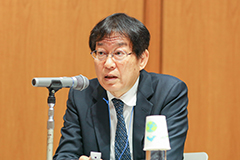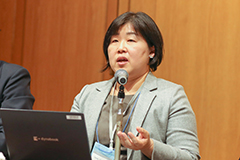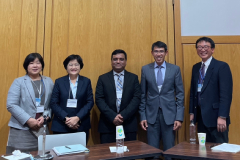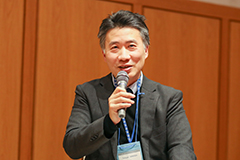IMF-JICA Conference on ‘Recovery from the Pandemic in Developing Asia: Achieving Inclusive and Sustainable Growth with Sound Fiscal Management’
2023.04.18
The conference "Recovery from the Pandemic in Developing Asia: Achieving Inclusive and Sustainable Growth with Sound Fiscal Management” was held in collaboration with the International Monetary Fund (IMF) and JICA on Feb. 14, 2023. Delegates from 13 countries in Asia gathered in Tokyo, to discuss fiscal and monetary policies for economic recovery from the compounding crises of the COVID-19 pandemic, Russia's invasion of Ukraine, energy and food price hikes, and climate change.
Among presenters and discussants addressing each agenda, Hirota Koki, visiting fellow, Makimoto Saeda, principal research fellow, and Harada Tetsuya, executive senior research fellow from JICA Ogata Research Institute took part in the conference.
In the first session, the fiscal challenges caused by the pandemic in Asian developing countries were discussed. Krishna Srinivasan and Vítor Gaspar of the IMF outlined the outlook for Asian economies, including the challenges of the financing gap toward achieving the Sustainable Development Goals (SDGs) and the economic scarring the countries are facing. In their presentations, it was recommended that fiscal policies and structural reforms be implemented in the areas of human capital and social protection, climate change measures, and digitalization for long-term growth, while balancing emergency responses to compounding risks and medium-term fiscal sustainability. A comprehensive approach to integrating green transition into the development strategies was also discussed.

Hirota Koki, visiting fellow at the JICA Ogata Research Institute
Hirota Koki, visiting fellow at the JICA Ogata Research Institute and a professor at the Graduate School of Humanities and Social Sciences, Saitama University, presented the results of a study he conducted with colleagues to estimate the financing needs for social infrastructure—education, health, public housing, and government building—in 45 Asian countries for the period of 2021-2030. The study also estimates the additional financing requirement to respond to the COVID-19 pandemic. It concludes that financing needs are estimated at US$1.7 trillion annually and US$1.8 trillion with the COVID-19 response scenario. These figures include the needs for rehabilitation and replacement, which are not usually included in such estimates. Finally, to address the estimated significant financing gap, he made several policy recommendations, including more integrated funding, such as greater use of land value capture, and improved investment efficiency, such as multipurpose use of facilities.
Discussions on Universal Health Coverage (UHC) in the second session were instigated by Tobe Makoto, senior advisor of the Human Development Department, JICA. In his presentation, Tobe showed an overview of investment in health toward resilient universal health coverage (UHC) by illustrating that UHC is an essential requisite for achieving the SDGs. To the ministers of finance, he conveyed a message that investing in health has a lot of good returns, and the role of the ministry of finance is to promote more and smarter investment in health to protect poor and vulnerable people.
Makimoto Saeda, principal research fellow at the JICA Ogata Research Institute, provided an analysis on the COVID-19 Crisis Response Emergency Support Loan, which was established by the Japanese government to address emergent needs during the COVID-19 pandemic and to stimulate economic activities in developing countries. The programs, which amounted to an average of $217 million each (equivalent to 2.6% on average of each country’s general government expenditure in 2020), were carried out both in the early stages of the COVID-19 pandemic as immediate responses and during the subsequent recovery phase. She said the programs not only helped bridge the immediate financial gap, caused by an increase in government expenditure in multiple sectors of society due to the pandemic, but also promoted the health system strengthening from the medium- and long-term viewpoint in order to attain sustainable and inclusive society.

Makimoto Saeda, principal research fellow at the JICA Ogata Research Institute
Next, Vandine Or, secretary of state, the Ministry of Health of Cambodia, elaborated on the experience and lessons learnt from the COVID-19 response in Cambodia. She outlined how Cambodia jumped to the leading positions of Nikkei’s COVID-19 Recovery Index, and emphasized that health and the economy should go together. Pum Huot, undersecretary of state, the Ministry of Economy and Finance, Cambodia, demonstrated the quick recovery of Cambodia showing the economic performance of the country before and during the pandemic. He explained that this recovery was achieved by implementing the policies of an integrated approach for recovery, reform and resilience.

Presenters of the second session
The conference was concluded by roundtable discussions. Benjamin Diokno, secretary, the Department of Finance of the Philippines, said that measures taken to overcome the financial challenges faced during the pandemic was to lend money, about 650 billion pesos, to the national governments through the central bank of the Philippines. This had significantly helped national governments secure basic necessities to exhibit resilience during and after the pandemic.

Harada Tetsuya, executive senior research fellow at the JICA Ogata Research Institute
Lkhagvasuren Byadran, governor of the Bank of Mongolia, explained how the pandemic and the anti-pandemic law imposed by the Mongolian government affected the reliance of his country on exports amounting to 80% mainly directed to China and how border closure led to drastic price hikes.
Harada Tetsuya, executive senior research fellow at the JICA Ogata Research Institute noted the need to address the long-term negative effects of delays in education, health, and infrastructure development on growth and productivity, known as “scarring effects”, in the recovery process from the pandemic and subsequent economic crisis. Given the limited fiscal space, Harada also highlighted the importance of cost-effectiveness when the governments allocated expenditure to social sectors. Regarding the lessons from the debt crisis, he added that debt management should be of concern about not only how much a country is borrowing but also for what projects these loans are used, referring to cases where parts of loans were used for political ends with low return.

事業事前評価表(地球規模課題対応国際科学技術協力(SATREPS)).国際協力機構 地球環境部 . 防災第一チーム. 1.案件名.国 名: フィリピン共和国.

事業事前評価表(地球規模課題対応国際科学技術協力(SATREPS)).国際協力機構 地球環境部 . 防災第一チーム. 1.案件名.国 名: フィリピン共和国.

事業事前評価表(地球規模課題対応国際科学技術協力(SATREPS)).国際協力機構 地球環境部 . 防災第一チーム. 1.案件名.国 名: フィリピン共和国.

事業事前評価表(地球規模課題対応国際科学技術協力(SATREPS)).国際協力機構 地球環境部 . 防災第一チーム. 1.案件名.国 名: フィリピン共和国.

事業事前評価表(地球規模課題対応国際科学技術協力(SATREPS)).国際協力機構 地球環境部 . 防災第一チーム. 1.案件名.国 名: フィリピン共和国.
scroll